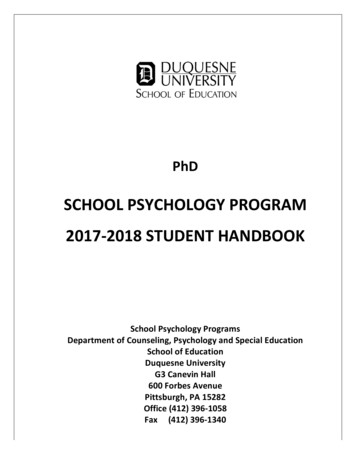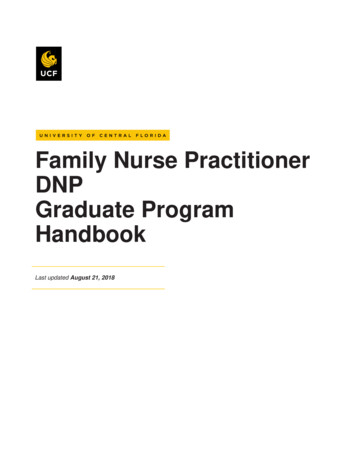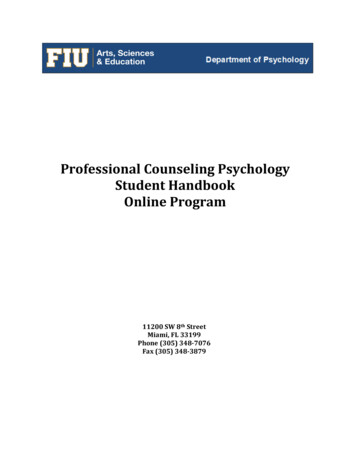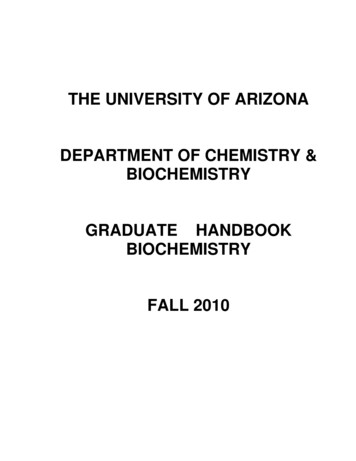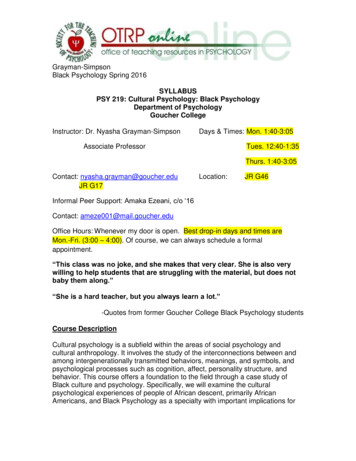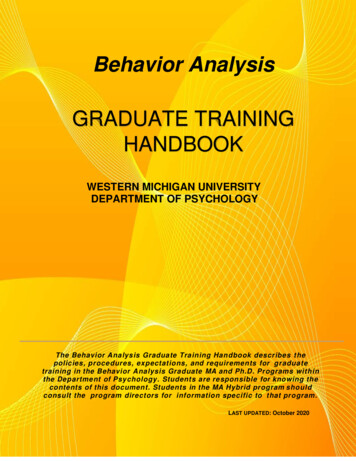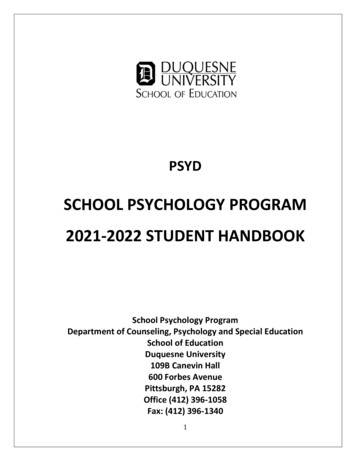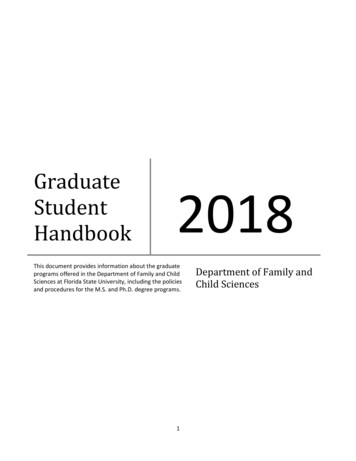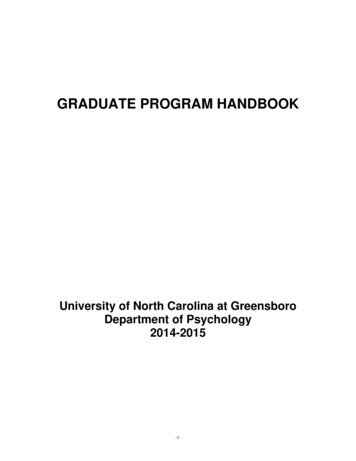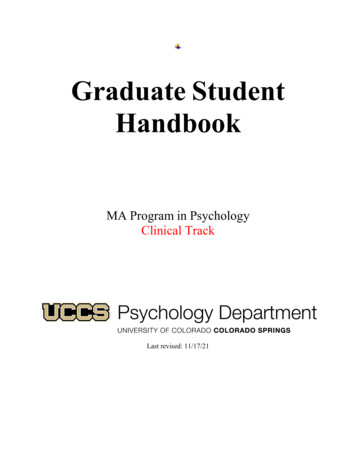
Transcription
Graduate StudentHandbookMA Program in PsychologyClinical TrackLast revised: 11/17/21
2Table of ContentsI.II.III.IV.V.IntroductionA. UCCS Graduate School MissionB. Philosophy of the Clinical TrackRequirementsA. General CourseworkB. Core Content Course SeriesC. Coursework in Applied SkillsD. Empirical Research ThesisE. Sample Clinical Track Course SequenceF. Transfer CreditsG. Important Note about LicensureStudent Mentoring, Evaluation, Termination and GrievancesA. MentoringB. Yearly EvaluationC. Grades and Quality of Graduate WorkD. Comprehensive Evaluation PolicyE. Policy on Professional ConductF. Policy Related to Trainees Who Experience Conflicts Working with DiverseClients/PatientsG. Policy on Professional Impairment: Students Demonstrating Lack of ClinicalCompetency and/or JudgmentH. Policy on Professional Impairment: Students Demonstrating Lack of ClinicalCompetency and/or JudgmentI. Student TerminationJ. Grievance and Appeal ProceduresSexual Harassment, Student Self-Awareness, Student Representation andOrganizations, and Other PoliciesA. Sexual Harassment PolicyB. Personal File/PortfolioC. Self-Awareness and Personal PsychotherapyD. Student RepresentationE. Psychology Graduate Student OrganizationF. Faculty and Supervision EvaluationsG. CommunicationH. Policy on Private Practice SettingsI. Policy on Professional Liability InsuranceJ. Policy on Outside EmploymentK. Policy on Background Checks and Criminal HistoryFinancial SupportA. Financial AidB. FellowshipsC. Federal Work-studyD. TravelE. Colorado Residency Requirements
3VI.VII.Other ResourcesA. Virtual Private NetworkB. Kraemer Family LibraryAppendicesA. Statement of Scope of Training and Standards of BehaviorB. Financial Aid Office FlierC. Professional OrganizationsD. Tracking Form for Practicum Hours (Clinical MA only)
4I. INTRODUCTIONWelcome to the terminal MA Program in Clinical Psychology at the University of Colorado atColorado Springs (UCCS). This Graduate Student Handbook is designed to provide you withinformation about the program requirements, policies, and procedures. It supplements theinformation available in the UCCS Graduate Student Survival Guide (available at GraduateSchool website: http://www.uccs.edu/ gradschl) and the UCCS Standards for Academic andBehavioral Conduct (https://dos.uccs.edu/student-conduct). To be fully informed of all importantrequirements, you should read all three of these documents in their entirety. It is yourresponsibility to be informed of all relevant requirements and procedures. You are required tosign the written statement (at the end of this document) acknowledging that you have received,read, and agree to the policies and procedures detailed in this handbook. You will receive thisdocument electronically prior to the first semester beginning. Please sign as soon as possible. Amore formal orientation session is conducted for all entering students upon arrival on campus.A. UCCS Graduate School Mission: The mission of the Graduate School is to promoteexcellence in graduate education and to facilitate and enhance the educational experienceand opportunities for graduate students. The Graduate School has the responsibility foroversight and coordination of graduate programs, and to ensure compatibility amongprograms and compliance with Graduate School policies. It is decentralized with maincontacts residing within the department of Psychology (see below). Contacts for GraduateSchool information are Leilani Feliciano (Director of Clinical Training), Sara Qualls(Associate Director of Clinical Training), Andrea Williams (Department Administrator),and David Dubois (Program Assistant).B. Philosophy of the Clinical Track: The clinical track of the Master of Arts in Psychologyfollows the Boulder scientist/practitioner training model which emphasizes the integratedroles of science and practice. Training in the applied skills of clinical assessment andintervention requires a thorough understanding of the range of human functioning. Thedatabase of the psychological literature is our groundwork and the scientific methodguides our work. We require students to develop an understanding of how this database isgenerated, how to evaluate its utility, and how to apply it. Thus, all students are requiredto take the core methodology and basic psychology courses in addition to the clinical coresequence and a clinical practicum experience in the community. Because a two-yearcurriculum can provide only the basics, it is expected that we are preparing students toproceed with training at the doctoral level. For a more detailed discussion of the clinicalstandards and goals, see our “Statement of Scope of Training and Standards of Behavior”(in Appendix A).The clinical program values and promotes self-awareness as a significant component oftraining in clinical psychology. Students in this program engage in self-awarenessexercises within their courses and practicum training. They are also encouraged to engagein their own psychotherapy during their training, if needed.Prospective students should be aware that the clinical MA track has a focus on adultpopulations. There is limited coverage of child-related topics in the clinical coursework
5and limited child-oriented practicum opportunities. While research opportunities withchildren and adolescents are possible, limited clinical training with children is providedin the clinical MA track.The clinical program is primarily designed to prepare students for doctoral degrees inpsychology or related fields. Consistent with this goal, a majority of our clinical MAstudents have been subsequently accepted into Ph.D. and Psy.D. programs.Department Contacts:Daniel Segal (Department Chair)dsegal@uccs.edu255-4176Beth Daniels (Director of Psychological Science [DPS])edaniels@uccs.edu255-4145Leilani Feliciano (Director of Clinical Training [DCT])lfelicia@uccs.edu255-4174Sara Qualls (Associate DCT, Director of Clinical MA)squalls@uccs.edu255-8038David DuBois (Department Program Assistant)ddubois@uccs.edu255-4500Laura Chandler (Department Program Assistant)lchandl2@uccs.edu255-4661Andrea Williams (Department Administrator)awilliam@uccs.edu255-4158II. REQUIREMENTSA. General CourseworkThe program of study has three components that are common to both the clinical trackand the psychological science track:(a) coursework in research and the scientific method(b) coursework in the knowledge base of psychology: the core content series(c) an empirical research thesis.The following research and methods courses are required of all clinical students:PSY 5810 Research Statistics and Methodology IPSY 5820 Research Statistics and Methodology IIPSY 6030 Research PracticumIn addition, the clinical track requires:(a) didactic coursework in assessment, intervention, and applied skills; and(b) a practicum experience in which students learn and apply clinical skills under thesupervision of experienced clinicians. Practicum sites are typically selected by the studentin the Spring semester of the first year for a start date in the Summer after the first year.The Associate DCT will hold meetings to orient clinical students to the application andselection process for practicum placements. Practicum placements typically include 10-
615 hours per week for 10-12 months, or a minimum of 450 hours. Students must keep arecord of hours worked at their practicum site. A form to use for this purpose is availablein Appendix D. This form should be completed at the end of each semester of practicumtraining and at the completion of the practicum. If this record is not provided to theAssociate DCT or department, then the department will be unable to vouch for thenumber of hours you have worked at your practicum site.Clinical students may be required to start their practicum during the summer betweenfirst and second years. Also, clinical students may be asked to continue research dutiesduring the summer. These factors depend on the needs of their practicum site that thestudent selects and the student’s research advisor.Clinical training involves collaboration and partnerships with multiple training sites,including practicum placements, and other settings such as research labs and otheracademic departments. Communication between clinical training programs and thesetraining partners is of critical importance to the overall development of competent newpsychologists. Therefore, it is the position of the UCCS training program that regular andopen communication about students’ performance and progress must occur between theprogram faculty and other training partners, and that the content from this communicationwill contribute to regular evaluation of the student’s progress.It is very helpful for students to meet with Andrea Williams (Department Administrator)regarding their schedules before/when they first arrive, and at the beginning of each fallsemester. Students meet with Andrea for planning purposes to make sure they are takingthe correct courses and to create an academic course plan for their time at UCCS.B. Core Content Course SeriesStudents in the clinical track are required to take two of the core content courses. Theparticular courses chosen will vary from student to student depending on the student’sarea of concentration and course availability. The available core content courses are:Group APSY 6100 Developmental PsychologyPSY 6110 CognitionPSY 6120 NeurosciencePSY 6130 Social PsychologyGroup BPSY 5210 Psychology of Aging I*PSY 5220 Psychology of Aging II*PSY 6160 Trauma Psychology I PSY 6170 Trauma Psychology II Students must take at least one course from Groups A and a second from A or B to meetrequirements. In addition, you may not be able to enroll in your preferred seminars dependingon your timeline for graduation and enrollment limits on seminars.*Note: MA students may count either PSY 5210 or PSY 5220 as a core content coursefor graduation requirements, but not both. Note: MA students may count either PSY 6160 or PSY 6170 as a core content coursefor graduation requirements, but not both.
2C. Coursework in Applied SkillsThe clinical core consists of a set of didactic courses and a set of applied skills courses.The didactic requirements include the following courses:PSY 6780 Advanced PsychopathologyPSY 6850 Clinical Interviewing and Personality AssessmentPSY 6920 PsychotherapyPSY 6860 Cognitive Assessment or PSY 6870 Clinical Neuropsychology (6860preferred)The applied skills requirements include the following courses:Students take a course in basic interviewing skills (PSY 5710, Clinical Skills Lab) duringtheir first year and a clinical practicum (taken in conjunction with PSY 6720,Professional Development I, and PSY 6730, Professional Development II) during theirsecond year. Practicum experiences are completed at several sites either on-campus (atthe UCCS Wellness Center, Veterans Health and Trauma Clinic, or Aging Center) or inthe community under the close supervision of a licensed mental health professional in theState of Colorado. The goal of these experiences is to expose students to clinical settingsand the roles of clinical psychologists, and to begin the development of clinical skills.Placements must be approved by the Associate DCT. Most sites require a 10-12 monthcommitment. Students are expected to work between 10-15 hours per week at their site,or a minimum of 450 hours.To enroll for and begin a practicum, students must satisfactorily completerequired courses (1st year sequence listed below) for the program, be a student ingood standing, and maintain a GPA of at least 3.0. Students at various practicumsites will be required to undergo a background check before starting. A history ofcriminal activity and/or a criminal record may prevent a student from locating asuitable practicum experience. Questions about practicum requirements andeligibility can be directed to faculty advisors, the DCT, or Associate DCT.Students choosing the Aging Center or theVHTC must enroll in PSY 6740—Clinical Practicum, with their faculty supervisor.D. Empirical Research ThesisA research-based empirical thesis is required of all MA students. The psychology facultymembers are actively engaged in research; Master’s students are encouraged to establisha mentorship relationship with a faculty person and can choose to develop a thesis froman ongoing research project. The research and scientific method coursework is designedto help the student formulate a research proposal, analyze the data collected, and write upthe results for scholarly publication. In addition to those courses, students take 6 credit
3hours of PSY 7000 Thesis. Students are encouraged to present their work at regional andnational meetings and to write up their research for publication.E. Sample Clinical Track Course SequenceThe clinical track requires a minimum of 44 credit hours. The required courses can becompleted by a full-time student in 2 years if the following course sequence is followed:YEAR 1Fall:PSY 5710 Clinical Skills LaboratoryPSY 5810 Research Statistics and Methodology IPSY 6780 Advanced PsychopathologySpring:PSY 5820 Research Statistics and Methodology IIPSY 6850 Clinical Interviewing and Personality AssessmentPSY 6920 PsychotherapyPSY 6xxx Core Content CourseYEAR 2Fall:PSY 6030 Research Practicum,PSY 6720 Professional Development I; Ethics and Standards of Practice,PSY 6860 Cognitive Assessment OR Clinical Neuropsychology in Spring Year 2 (6860preferred)PSY 7000 Masters ThesisSpring:PSY 6730 Professional Development II Cultural and Family DiversityPSY 7000 Masters ThesisPSY 6xxx Core Content CourseMany students choose to stay an additional semester or year. If this best fits yourprofessional and/or personal goals, please speak with the Associate DCT, your mentor,and Andrea Williams to talk about changes to your course schedule.F. Sub-plansMA students have the option to gain experience within one of two specialized sub-fields,formally called “sub-plans” in the discipline. The sub-plans include trauma psychology
4and geropsychology. These more narrowly-focused programs specify required courseswithin the MA program, completion of a research thesis under the direction of a facultymentor with expertise in that particular sub-discipline of psychology, and a practicum at asetting in that domain. Students who enroll in an optional sub-plan glean the benefits of amore concentrated focus of study that is reflected on their transcripts. For requiredcoursework, students in the Trauma Psychology sub-plan must take either TraumaPsychology I or II. For the Geropsychology sub-plan, students must take eitherPsychology of Aging I or II. Faculty members are typically assigned to each sub-plan,but working with an assigned faculty member is not a requirement. If a student in thesub-plan is working with a mentor not assigned to the sub-plan, the thesis topic must beapproved by the DCT or Associate DCT.G. Transfer CreditsRequests to transfer graduate courses from other graduate institutions must be made tothe DCT and Associate DCT via email. Typically this request is made after the studenthas been admitted to or enrolled in our MA program but before the student officiallyenrolls in classes. The request must include the formal syllabus from the previous courseto help us evaluate equivalency of the classes. In some cases, the student may be asked toprovide additional information about the course, such as relevant catalog descriptions andassignments to help the DCT and Associate DCT determine equivalency of the classes.Upon receipt of the request and the syllabus or syllabi, the transfer request will bereviewed by the DCT and Associate DCT who will either approve or deny the requestwithin 2 weeks. Should approval be given by the DCT and Associate DCT, the acceptedlist of transfer credits and courses will be documented on your curriculum plan withAndrea Williams. Transfer requests will not be considered if they are submitted afterOctober 1st of the student’s first semester in the MA program.A Transfer of Credit form must be completed and approved by the Graduate Schoolbefore graduation.H. Important Note about LicensureThe terminal MA program in Clinical Psychology at the University of Colorado ColoradoSprings is designed to prepare students for further training at the doctoral level. The goalis that the students are eventually eligible to become licensed as a Psychologist once theyhave completed the Ph.D. degree or Psy.D. degree at another institution. As such, ourprogram is not designed to meet the master’s level licensure requirements as aLicensed Professional Counselor in the State of Colorado.It is imperative that potential students in our MA program carefully research theeducational requirements for the intended licensure or certification in the state(s) wherethey will seek licensure or certification. Because we are not designated as a licensureprogram, we have not sought approval by the Council for Accreditation and OtherRelated Educational Programs (CACREP). Please note that the licensure requirements ofstate boards and licensing agencies vary from state to state and also change over time.
5Consequently, successful completion of MA degree requirements does not guarantee thata state board or licensing agency will accept a graduate’s application for licensure at theMA level. It is important that potential students are aware of their responsibilitiesregarding licensure and certification.Please note that it is absolutely necessary that you save the syllabi from all of the coursesyou take and that you keep course catalogs from each year that you are a student in theterminal MA program in Clinical Psychology at the University of Colorado ColoradoSprings. Many licensing boards require detailed course descriptions that show whatspecific material and skills have been covered. By saving your own syllabi, you will havethe appropriate sections and classes that correspond to your transcript.Colorado State Licensure: Since 1989, Colorado has licensed masters’ levelprofessional counselors by instituting a licensure board and creating standards and testingto determine qualification for such licensure. The vast majority of other states also havelicensure requirements for masters’ level professionals, with each state having their ownrequirements and regulations. License requirements in one state do not necessarilytranslate to other states. These requirements may change over time. Full details regardingthe requirements for licensure as a Licensed Professional Counselor (LPC) in the State ofColorado are available from:State of Colorado, Department of Regulatory Agencies (DORA)Website: https://dora.colorado.gov/Potential students in our MA program are advised to carefully review licensureinformation provided by DORA and to be aware that it may not be possible for ourgraduates to become licensed in Colorado as a LPC without taking additional courses orwithout taking an additional practicum. As laws for licensure at the MA level becomemore stringent, it may be the case that graduates from our MA program will not be ableto become licensed in Colorado as a Licensed Professional Counselor even withadditional training and courses at another program. Please check the state requirementscarefully if you are planning on attending our MA program and pursuing licensure at theMA level.III. STUDENT MENTORING, EVALUATION, TERMINATION, ANDGRIEVANCESA. Mentoring: The clinical program follows a mentorship model. During theadmissions process or at the beginning of the first year, each student selects an initialfaculty mentor, based on mutual research interests. Your mentor will be a highlyimportant person for you here, one who will hopefully give you a great researchexperience, advise you throughout graduate school, and help you to some extentthroughout your career. Thus, selecting a mentor is a very important task for you, andone that should be done with a great deal of thoughtfulness.
6One of the best ways to get information about a mentor and a lab is to speak tocurrent students in the lab. Even if you have already selected a mentor, you arestrongly encouraged to speak to current lab members to get their perspective on thelab and how it runs so that you will be armed with great information to make therelationship a success. It is also very important to ask your potential mentors to layout for you the expectations they have of students in the lab so that you can determineif their expectations and work styles match yours. It is important to determine if you“fit” well with your mentor and select someone with whom you feel confident youcan develop a positive working relationship.The faculty mentor maintains responsibility for consultation with his/her adviseeson all academic and research matters. Most students maintain the same mentorthroughout their studies. However, in some cases interests change or work stylesare not compatible. Students and faculty are encouraged to work togetherprofessionally when a change in mentors is desired. Students desiring to changementors should discuss this with their present mentor in a timely manner and atleast before a final decision is made. As they are considering a change in mentors,it is understood that students may wish to consult peers, other faculty, theAssociate DCT, and/or the DCT, but they should not proceed to work with a newmentor before notifying their present mentor and making an official change withthe Associate DCT.Additional information for first-year students is offered by the Graduate Schoolthrough their UCCS Graduate Student Survival Guide available at the website for theGraduate School (http://www.uccs.edu/ gradschl//). A more formal orientationsession is conducted for all entering clinical students by the Associate DCT and DCTupon arrival on campus.It is very helpful for students to meet with Andrea Williams, Program Assistant forthe Psychology Department, regarding their schedules before/when they first arrive,and if opting for a three-year degree plan. . Students moving to a three year planmeet with Andrea for planning purposes to make sure they are taking the correctcourses and to create an academic course plan for their time at UCCS.B. Yearly Evaluation: At the end of each spring semester (in May), every student in theclinical training program will be reviewed by the Clinical Program Committee todetermine whether the student is making appropriate progress in his or her clinical skilldevelopment and development as a scientist/scholar. The initial step in this reviewprocess involves the solicitation of feedback from faculty and clinical supervisors withwhom the student has worked during the year, including the student’s research mentor, inorganized classes, clinical practicum experiences, and relevant graduate assistant roles.This feedback is organized by the Associate DCT and is reviewed and discussed by theentire clinical faculty. The Associate DCT or the student’s mentor provides each studenta brief written summary of the clinical faculty’s evaluation and schedules a meeting formore in-depth oral feedback. The feedback indicates to students a clear messageconcerning whether their performance is viewed as (a) adequate, and if appropriate,
7recognition of recent accomplishments, or (b) whether any concerns or deficiencies havebeen noted; in that case, appropriate remedial steps with specific timelines are stated andthe Associate DCT confers with the student regarding these corrective steps. If a studentis demonstrating poor or possibly impaired performance or has evidenced behavior inviolation of program policy, a specific set of procedures is followed as outlined below inthe Student Termination section of this handbook.A midyear evaluation is done at the end of each fall semester (in December) in whicheach student in the program is reviewed, but the focus tends to be on identifying studentshaving difficulties so we can ensure proper support structures are in place to resolve theproblems before they become significant. Unless there is a notable problem, students donot receive specific feedback from the midyear evaluation, although they will all receivea letter stating if their performance has been adequate. Although these reviews relate toclinical skill development and development as a scientist/scholar, students are alsoencouraged to obtain additional feedback on their clinical and research training andspeak with their clinical supervisors and research mentor(s) regularly about their overallprogress in the respective areas. Students whose progress is satisfactory will maintaineligibility for continued financial aid and departmental funding. Students whoseperformance or progress is unsatisfactory may be given probationary status and/or havetheir funding terminated. If probation is not successfully resolved, the student may berecommended for termination from the graduate program, as per the policies below.C. Grades and Quality of Graduate Work: Article V, Section B of the GraduateSchool Policies and Procedures Manual located ts/policies-and-procedures) details theminimum requirements for grades and quality of graduate coursework. In addition, thePsychology Department has set the following standards and policies regarding grades:In order to graduate, a student must earn grades of “B-“ or higher or “P” (Pass) for allcourses listed in the required curriculum.Students receive “IP” (in progress) grades for thesis or dissertation research conductedbut not completed during a semester. The letter grade assigned in the final semester ofthesis research should indicate the student’s overall performance on the project.Student performance in any courses other than thesis, dissertation, and practicum courseswill be assigned a letter grade (A, A-” “B , B, B-,” “C , C, C- D , D, D- or F).The grade of “I” (incomplete) is given when the instructor believes that the course workis unavoidably incomplete or that a supplementary examinationis justifiable.The instructor changes the grade online when the work is completed.Students cannot graduate with an “I” on their record. A grade of “I” must be removed bythe end of the next semester (exclusive of summer sessions) unless the student has asigned contract with the instructor specifying a different deadline. The contractspecifying a different deadline also should specify what is required for removal of the“I.” Failure to remove the “I” by the deadline (either the end of the next semester orother) will result in the student being placed on probation.
8Grades of “C” or Below: A grade of “C” or lower in any course taken by a graduatestudent is unsatisfactory. A total of two grades of “C” or lower results in the studentbeing automatically placed on probation. If a third grade of “C” or lower is received, thestudent may be dropped from the program. A student remains on probation until theClinical Program Committee is satisfied that appropriate remediation has occurred. Forrequirements of the Graduate School, see Article V, section B 1 and B 7 in the GraduateSchool Policies and Procedures: licies-and-procedures. Courses with a grade of C or lower do not counttoward graduation, so such a grade in any course in the student’s plan of study must beremediated. Appropriate remediation procedures are as follows:For all courses, the Clinical Program Committee and the course instructor defineremediation requirements, which could involve retaking the course. The student mustsubmit an acceptable remediation proposal, including timelines for completion, to theClinical Program Committee for consideration. The accepted proposal becomes a part ofthe student’s plan of study and is considered in assessing progress through the program.Further requirements adopted by the Clinical Program relating to the development ofinterpersonal clinical skills necessary to function as a professional psychologist aredetailed below.D. Comprehensive Evaluation Policy (adapted from CUDCP). Faculty, training staff,supervisors, and administrators of the Clinical Psychology Training Program at UCCShave a professional, ethical, and potentially legal obligation to: (a) establish criteria andmethods through which aspects of competence other than, and in addition to, a studenttrainee’s knowledge or skills may be assessed (including, but not limited to, emotionalstability and well-being, interpersonal skills, professional development, and personalfitness for practice); and, (b) ensure, insofar as possible, that the student-trainees whocomplete our Program are competent to manage future relationships (e.g., client,collegial, professional, public, scholarly, supervisory, teaching) in an effective andappropriate manner. Because of this commitment, and within the parameters of ouradministrative authority, our faculty, training staff, supervisors, and administrators strive
9not to advance, recommend, or graduate students or trainees with demonstrable problems(e.g., cognitive, emotional, psychological, interpersonal, technical, and ethical) that mayinterfere with professional competence to other programs, the profession, employers, orthe public at large.As such, within a developmental framework, and with due regard for the inherent powerdifference between students and faculty, students and trainees should know that thefaculty, training staff, and supervisors of this Program will evaluate their competence inareas other than, and in addition to, coursework, seminars, scholarship, preliminaryexaminations, or related program requirements. These evaluative areas include, but arenot limited to, demonstration of sufficient: (a) interpersonal and professional competence(e.g., the ways in which student-trainees relate to clients, peers, faculty, alliedprofessionals, the public, and individuals from diverse backgrounds or histories); (b) selfawareness, self-reflectio
The clinical core consists of a set of didactic courses and a set of applied skills courses. The didactic requirements in clude the following courses: PSY 6780 Advanced Psychopathology PSY 6850 Clinical Interviewi ng and Personality Assessment PSY 6920 Psychotherapy PSY 6860 Cognitive Assessment or PSY 6870 Clinical Neuropsychology (6860
